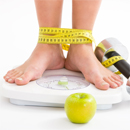Do your emotions control your weight?
There are those who eat because they are hungry. However, there
are those who eat because, to them, food is like a pacifier.
They eat when they are frustrated, angry, sad, depressed or
bored. This is can lead into a major eating disorder.
There’s a reason why many of us eat this way. When we were
young, we were brainwashed as it were to believe that many of
the foods we ate were “comfort foods,” that to eat food meant we
were feeling good. Ever so often our families would come over
for dinner or an outdoor barbecue, stuffing ourselves while
engaging in fun and frolicking.
If you think about it we celebrate our birthdays, graduations,
weddings, and any other social gathering with food. So we
automatically associate gorging ourselves with feeling good. Or
perhaps as a child you were taught to eat over your pain. Hey,
you fell down and hurt your leg mommy will treat you with a nice
big bowl of ice cream. Sometimes, when we fell out of love for
some reason, we would resort to eating to ease the pain of it.
The psychology behind that is the eater thinks that food will
never reject them nor will it make them feel bad. Food will
never turn traitor. In other words, we look to have control
(look is the key word here). After all, we get to eat when,
where, and decide how much to eat. This is a fallacy.
In past history, we can see this many times. People will feel
some type of emotion, be it stress, sadness, anger, loneliness,
boredom, or any other emotion that sees fit to enter the
picture, and turn to food to ease those feelings. This again is
a fallacy because no matter how it may satisfy us initially, it
is only a temporary fix. The end result – guilt or frustration,
and above all that – fat. How do I know I’m an emotional eater?
You know you’re an emotional eater when your first response to
any sort of emotion that is beyond the norm is to eat and eat a
lot. Emotional eaters use food as a pacifier and manager of
their feelings. Even if those feelings give you minor
discomfort, you will binge. What it does, is take your mind off
the problem for a while – but eventually, after it is all said
and done, the problem will still be there, along with more pain
and anguish from you for giving in to the craving. For emotional
eaters it is a roller coaster ride. Can it be stopped?
The best way to stop is by starting a food journal so you can
keep track of what you eat and when. This way you can recognize
patterns. You can recognize what emotions you felt when you ate.
After you have tracked your routine for a while, go back and
take a look at your food journal. You should be able to spot a
pattern quickly and easily. When you identify what causes you to
binge so much, it will be much easier to know when to expect
them, and in turn, how to deal with the emotion itself instead
of trying to mask it with food. The best way to fight it is to
learn what emotion you feel and tackle that emotion head-on!
Other Choices While writing things down in your journal, make a
list of things you can do during those emotional stages instead
of eating. For example, if you feel bored, instead of going for
food, do a little exercising. This will strengthen your body and
make you feel better. Another way to describe it is to replace
the emotion with something more positive that will give you
beneficial results.
Learn what is emotion and hunger There are many times when it is
difficult to know the difference between a physiological need
for food and a psychological want. Real, physical hunger comes
on gradually, giving you signs to let you know when it is time
to eat – small gurgles followed by large rumbles. At this time
you eat more than one kind of food. You eat a variety. But you
eat only to satisfy that hunger.
On the other hand, emotional eating comes on suddenly. At the
moment you weren’t even thinking about food. But then the next
minute you think you are famished. This is not physically based,
it is psychologically based. You think you need to eat but you
don’t. Your mind plays tricks on you and causes you to eat when
you don’t need to.
The best ways to avoid this problem when cravings hit are to
wait for twenty to thirty minutes before you indulge. During
this time, you may realize that you really don’t have any
cravings, or you may figure out what you really do need and go
after that instead. Usually after a few minutes have passed, the
cravings will go away and you won’t have the temptation anymore.
Another way to combat binging is to schedule your eating
patterns throughout the day. Only eat three meals a day, plus
two snacks, and stop eating two hours before bedtime. When your
body gets use to this schedule, you’re more likely to be hungry
at the same times each day.
Make sure you go after the main issues that are causing you to
eat when emotions strike. By going after and changing these
feelings, your eating habits and attitude toward food will
change to.
-
Coconut Oil , Weight Loss and Heart Health – An Unlikely Partnership
-
Diet Pills – Do They Work? Are They Safe? Which One Should I Use?
-
Count Colors Not Calores to Lose Weight!
-
Diet – Foods to Avoid When On Any Diet!
-
Weight Loss and Dieting Secrets – What You DON’T Want to Know!
-
3 Day Diet — Make Believe Diet Plans
- DON'T MISS
- Gastric Bypass Surgery – What Are The Risks?
- The Shell Game that is the “Proprietary Blend”
- Principles of Effective Weight Loss
- Living with Your Diet
- Coconut Oil Diets
- The Most Important Tool In Weight Loss
- Finding Your Way Home: Lost in the Fad-Diet Jungle
- 4 Surefire Ways NOT To Lose Weight At Your Health Club
- Medical Conditions That Inhibit Weight Loss
- Add High Water Content Fruits and Vegetables to Your Diet For Fast Weight Loss




